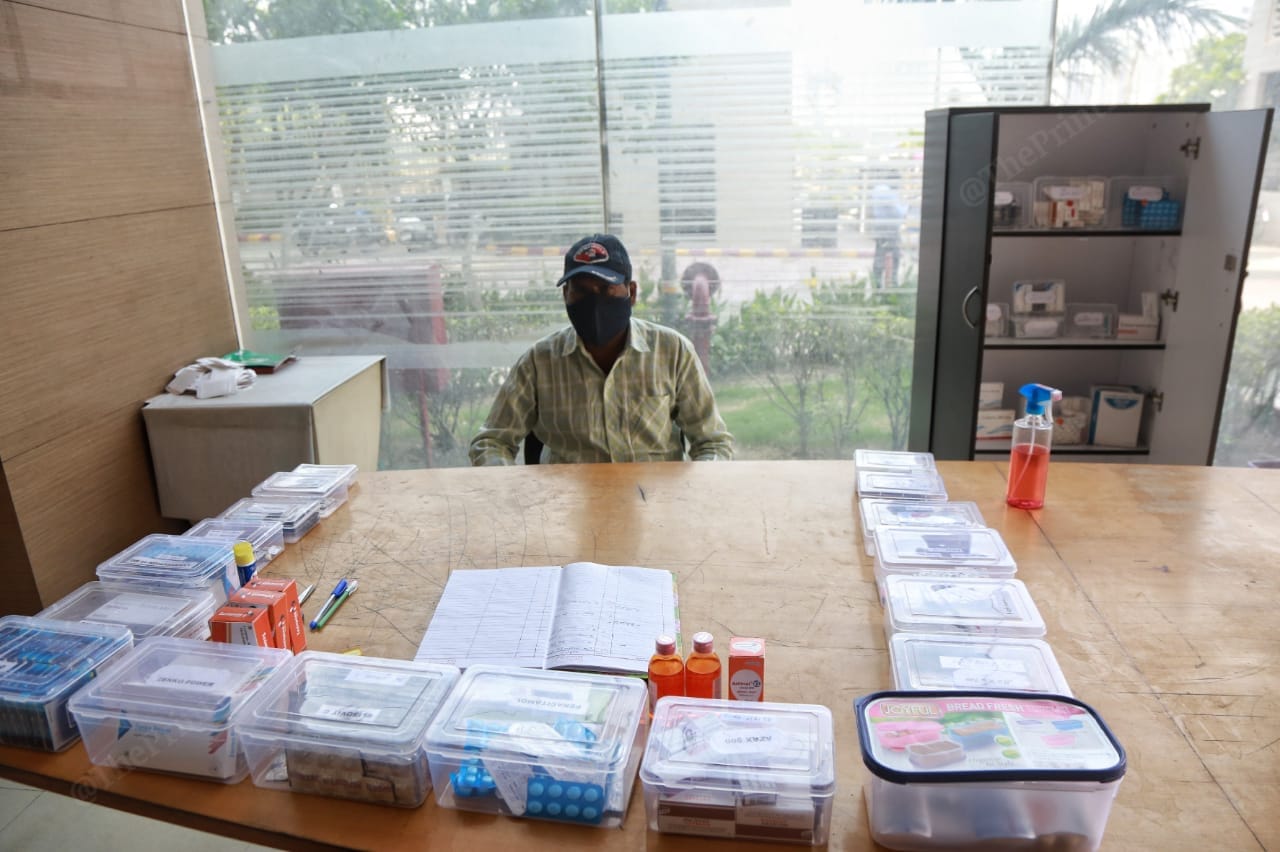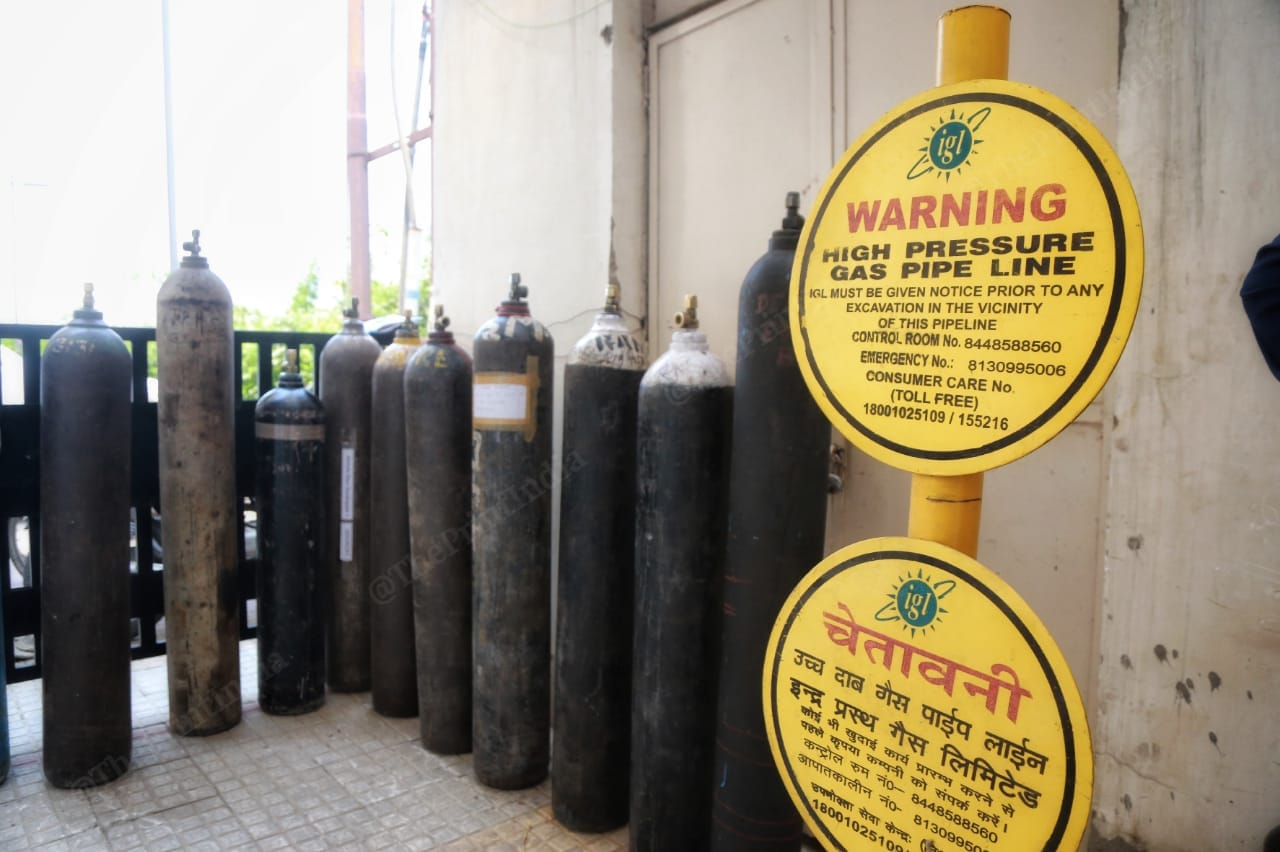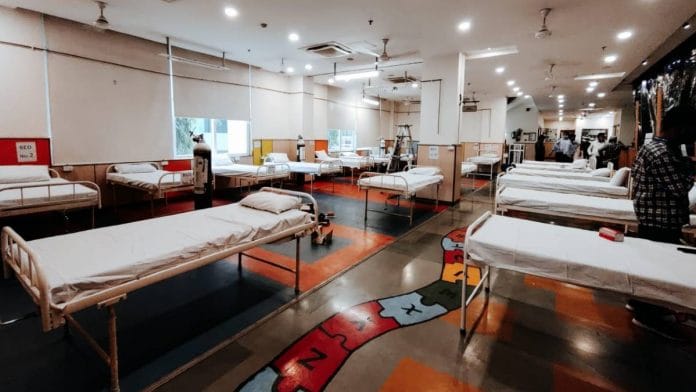New Delhi: At a time the state infrastructure seemed to be falling apart with hospital beds and access to medical care coming up short amid the second Covid wave, help and solace came from an unlikely source — resident welfare associations (RWAs).
Residents in these associations came together, pooling money and resources to help neighbours in their societies. If it was sending meals or arranging food in some instances, it was finding hospital beds or organising oxygen supply in others. At some localities, RWAs even set up isolation centres for Covid patients, complete with oxygen support.
It was in these acts that RWAs showed it took an ‘atmanirbhar Bharat’ to survive the latest Covid onslaught. Though daily cases in the capital city have now dipped to around 6,500 with a positivity rate of 10.4 per cent, at its peak, Delhi was recording about 24,000 daily cases on average. The highest tally was 28,395 cases on 20 April and a positivity rate of 36 per cent on 22 April.
At the time, social media posts and conversations were filled with appeals for help and self-starting individuals trying to connect patients in need with verified leads on medicines, oxygen equipment and hospital beds.
Alok Kumar, founder of Federation of Apartment Owners Associations Ghaziabad, said societies were left to fend for themselves in the absence of help from the government. So, RWAs dug into maintenance funds to help residents in need.
Also read: 1 doctor for 1,511 people, 1 nurse for 670 — Covid exposes India’s healthcare ‘fault lines’
How RWAs organised & helped
Several societies said they felt “abandoned” by their local administration, and had to make the best of what they had.
“The Ghaziabad DM (district magistrate) wasn’t picking (up) our calls. We sent out SOS on Twitter, where some politicians engaged with us but offered no help in the end. There were societies where 40 per cent of all apartments had at least one case in their families. They weren’t able to get tested, or once tested, they were unable to procure medicines or get a hospital bed. Residents were running pillar to post to procure medicines, oxygen tanks,” said Alok Kumar.
It was then that residential societies took it upon themselves to help each other out, said Kumar. Society associations in Ghaziabad such as Niho Scottish Gardens, Nirala Eden Park, Amrapali Village, Cloud 9 and ATS in Indirapuram set up their own isolation centres with oxygen concentrators or cylinders for residents in immediate need.
Societies also got in touch with residents who were doctors to provide advice via telemedicine to other residents. RWAs even set up their own medicine banks with Covid-related drugs. These banks were stocked with medicines such as favpiravir, dolo and zincovit, in consultation with doctors.

At Amrapali Village in Indirapuram, every third family was affected with Covid, according to Deepak Kumar, the RWA president. The RWA had sent out an SOS to the district administration on 21 April, but is yet to receive any response.
“Even after putting out SOS calls, we didn’t receive any help. At least 14 people died in mid-April. We spent Rs 1.5 lakh and procured nine oxygen cylinders of varying sizes. Our team of young volunteers have had to go to Aligarh to get them refilled,” said Deepak Kumar.
To curb the spread of the infection, Amrapali Village and Mahagun Moderne in Noida put in place their own lockdown measures. “We took a vote on our WhatsApp group and asked residents to vote on the lockdown. Most residents agreed on a self-imposed lockdown before the government could announce it. We restricted movement within the society and prevented the entry of any other person other than residents. We made provisions for essential supplies to reach people’s doorstep,” explained Mridul Bhatia, secretary, Mahagun Moderne RWA. Bhatia added that in mid-April, the society had more than 300 cases. “Now, in the first week of May, they were just 186.”
Since this wave of Covid saw entire families get infected by the disease, more practical and logistical challenges emerged, such as maintaining the household and ensuring meals for everyone. Many societies made arrangements for such families.
At Amrapali Village, the RWA hired two cooks to prepare meals and provide them to affected residents without any extra charge. At Mahagun Moderne, the RWA tied up with a nearby gurdwara to provide langar at the doorstep of such families. The United Federation of Resident Welfare Association in Hyderabad raised funds to provide dry groceries to families where breadwinners had lost jobs.
Anshul Devgan, who lives at Arihant Harmony in Indirapuram, recounted how the RWA helped his 37-year-old brother get hospitalised when his oxygen saturation dipped to 79-80.
“They arranged a bed in a hospital near my house and arranged for my brother to be taken there and admitted in the emergency ward … I don’t want to imagine what would have happened without their support,” he said.
Also read: What’s behind Delhi’s O2 crisis? A critical calculation Kejriwal & Modi govts forgot to make
Isolation centres
With the help of Gautam Buddh Nagar District Magistrate Suhas Lalinakere Yathiraj, some societies managed to get oxygen cylinders refilled for residents. “For the past three weeks, we’ve been collecting oxygen cylinders from our residents, which get refilled from Haridwar since Uttar Pradesh isn’t allowing oxygen to be sold to individuals. The DM has been a great help,” said Manish Kumar, vice president of New ERA Flat Owners Welfare Association, in Greater Noida West.
“It was a task to get cylinders refilled. We would run at the first lead we got and stood in 6-7-hour-long lines and often return empty-handed. We chased leads for oxygen refilling all the way to Manesar from Greater Noida. The RWA has been really helpful, and has literally saved lives … they were the only ones who stood for us when nobody else did,” said Prashant Chauhan, a resident of Victory 1 Central in Greater Noida (West).
Since 13 May, the residents have been able to get their cylinders refilled in Ghaziabad itself.

One of the other handy initiatives RWAs took up was setting up isolation centres for patients. According to Manish Kumar, approximately 15 societies have set up their own isolation centres while 50 societies made arrangements for oxygen cylinders.
At Mahagun Moderne, the RWA even procured a Pressure Swing Adsorption oxygen plant from Pune and are setting up an isolation centre at a play school located within the society.
The RWA’s secretary, Bhatia, said they had applied for permission for the oxygen plant with the UP Pollution Control Board, and are yet to receive approval. However, the RWA claims that the local administration is on board and no permission is necessary to open L-1 centres, a category of health centres that caters to non-critical patients.
ThePrint contacted Gautam Buddh Nagar DM Yathiraj and Ghaziabad DM Ajay Shankar Pandey but did not receive a response till the time of publishing this report.
The 50-bed facility is set to be operational from 18 May and will be open to all societies nearby. To fund the centre, the RWA plans to start a Covid fund. “I think our maintenance funds will be able to help us for a while, and additionally we’ve started a Covid fund and asked residents to donate. If that falls short too, we’re going to start charging people per bed,” he said. The isolation facility is estimated to cost them Rs 7-8 lakh a month.
Also read: Telangana student spends 11 days on a tree — he had nowhere else to isolate during Covid
Vaccine and testing drives
With vaccine stocks falling short and testing labs being overburdened, the weeks between April and May saw most everyone struggle. RWAs stepped up in this regard as well to help residents.
B.T. Srinivasan, general secretary, Federation of RWA of Greater Hyderabad, which has more than 380 associations under its umbrella, said the association has helped organise testing drives as well as help people get vaccinated. “We tried to ensure the community, especially senior citizens, got vaccinated on time. We helped them book slots on CoWin and arranged for transport for them. We’ve also helped our security guards, house help, and other staff who may not own smartphones or be very savvy with them book vaccine slots,” said Srinivasan.
In Bengaluru, Sampath Ramanujam, who is part of the Mahadevpura All Apartments Association, organised vaccine drives not only for their residents but even for people living in the slums and villages nearby.
For this, he sought help from Karnataka minister Aravind Limbavali, who is providing them with 60 vaccine doses every week, and organised a drive at a local school. “We can only give 60 tokens a day. But now, so many people are coming, asking for vaccines and we’re absolutely unable to help them,” Ramanujam said.
In Ghaziabad and Noida, apartment associations are tying up with private labs and conducting testing drives. Apart from easing the headache for individual residents, these drives are also giving societies an idea of how far Covid has spread in their area.
(Edited by Manasa Mohan)
Also read: I had Covid, when should I get vaccine? What if I miss second dose? Answers to these & more






